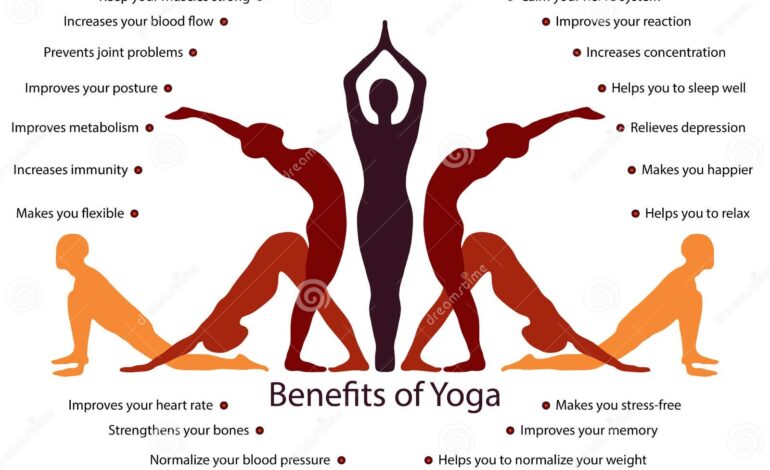Unlock Your Well-being: The Health Benefits of Yoga

The Comprehensive Guide to Yoga: Health Benefits and Effects
Yoga. The word conjures images of serene poses, mindful breathing, and a general sense of well-being. But yoga is far more than just stretching. It’s a centuries-old practice with deep roots in ancient Indian philosophy, and its benefits extend far beyond physical flexibility. This post will delve into the comprehensive health effects of yoga, exploring its impact on the body, mind, and spirit.
A Brief History of Yoga
The origins of yoga can be traced back over 5,000 years, originating in ancient India. Initially, yoga wasn’t about physical postures (asanas) as we often see today. It was more focused on meditation and spiritual development. Over time, different schools of yoga evolved, each with its unique approach. Hatha yoga, the style most commonly practiced in the West, emerged as a system focused on physical techniques to prepare the body for deeper meditative states. Modern yoga continues to evolve, incorporating elements from various traditions and adapting to contemporary needs.
Physical Benefits of Yoga
The physical benefits of yoga are perhaps the most widely recognized. Regular practice can lead to significant improvements in several areas:
- Increased Flexibility: This is often the first benefit people notice. Yoga poses stretch muscles and increase range of motion, improving flexibility over time.
- Improved Strength: Many yoga poses require you to support your own body weight, building strength, particularly in the core, arms, and legs. Holding poses engages muscles for extended periods, leading to endurance.
- Better Balance: Poses like tree pose (Vrksasana) and warrior III (Virabhadrasana III) specifically challenge your balance, improving proprioception (your body’s awareness of its position in space).
- Cardiovascular Health: While not all yoga styles are intensely cardiovascular, certain dynamic forms like Vinyasa or Ashtanga can elevate your heart rate and improve cardiovascular fitness. Even slower practices can positively impact heart health by reducing stress.
- Pain Management: Yoga has been shown to be effective in managing chronic pain conditions like lower back pain, arthritis, and carpal tunnel syndrome. Specific poses and breathing techniques can help alleviate pain and improve function.
- Improved Posture: Many of us spend hours hunched over desks or looking at screens, leading to poor posture. Yoga helps strengthen the muscles that support good posture and encourages proper alignment.
- Enhanced Respiration: Yoga emphasizes conscious breathing (pranayama), which can increase lung capacity and improve respiratory function.
Mental and Emotional Benefits of Yoga
The benefits of yoga aren’t limited to the physical realm. The practice has a profound impact on mental and emotional well-being:
- Stress Reduction: Yoga is a powerful stress reliever. The combination of physical postures, breathing techniques, and meditation helps calm the nervous system and reduce the production of cortisol, the stress hormone.
- Reduced Anxiety and Depression: Studies have shown that yoga can be an effective complementary therapy for anxiety and depression. It helps regulate mood, increase self-awareness, and promote a sense of calm.
- Improved Focus and Concentration: Yoga requires you to be present in the moment, focusing on your breath and body. This cultivates mindfulness and improves concentration.
- Increased Self-Awareness: Through yoga, you become more attuned to your body’s sensations, thoughts, and emotions. This increased self-awareness can lead to greater self-understanding and acceptance.
- Enhanced Mood: Yoga stimulates the release of endorphins, natural mood boosters that can leave you feeling happier and more positive.
- Better Sleep: By calming the nervous system and reducing stress, yoga can promote better sleep quality.
Different Styles of Yoga
There’s a wide variety of yoga styles to choose from, each with its own unique characteristics. Here are a few popular options:

- Hatha Yoga: A general term for any type of yoga that teaches physical postures. Often slower-paced and gentler, making it a good choice for beginners.
- Vinyasa Yoga: A dynamic style that links breath to movement, creating a flowing sequence of poses. Often more physically challenging.
- Ashtanga Yoga: A rigorous and physically demanding style that follows a specific sequence of poses.
- Iyengar Yoga: Focuses on precise alignment and uses props (blocks, straps, blankets) to help students achieve proper form.
- Restorative Yoga: A deeply relaxing style that uses props to support the body in passive poses, promoting relaxation and stress relief.
- Bikram Yoga (Hot Yoga): Practiced in a heated room, this style consists of a fixed sequence of 26 poses.
Getting Started with Yoga
If you’re new to yoga, here are a few tips to get started:
- Find a Qualified Instructor: A good instructor can guide you through the poses safely and effectively.
- Start Slowly: Don’t push yourself too hard, especially when you’re just beginning. Listen to your body and modify poses as needed.
- Wear Comfortable Clothing: Choose clothing that allows you to move freely.
- Hydrate: Drink plenty of water before, during, and after your practice.
- Be Patient: It takes time to develop flexibility, strength, and balance. Don’t get discouraged if you don’t see results immediately.
- Consider Online Resources: Many excellent online yoga classes and tutorials are available.
Potential Risks and Precautions
While yoga is generally safe, it’s important to be aware of potential risks and take precautions:
- Injuries: Improper form or pushing yourself too hard can lead to injuries.
- Medical Conditions: If you have any underlying medical conditions, such as high blood pressure, glaucoma, or sciatica, consult with your doctor before starting yoga.
- Pregnancy: Pregnant women should practice modified yoga poses under the guidance of a qualified instructor.
Conclusion
Yoga is a holistic practice that offers a wealth of benefits for the body, mind, and spirit. Whether you’re looking to improve your physical fitness, reduce stress, or deepen your spiritual connection, yoga can be a valuable addition to your life. With its diverse styles and accessibility, there’s a form of yoga for everyone. So, roll out your mat and begin your journey towards a healthier, happier you!



